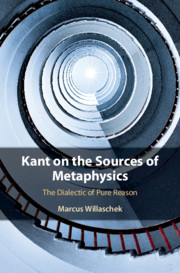Refine search
Actions for selected content:
8 results
Chapter 4 - Hegel’s Response to Kant’s Critique of Metaphysics
-
- Book:
- Hegel's Logic and Metaphysics
- Published online:
- 26 April 2023
- Print publication:
- 26 January 2023, pp 132-165
-
- Chapter
- Export citation
Chapter 8 - Kant’s Projected System of Pure Reason
-
- Book:
- Kant's Reform of Metaphysics
- Published online:
- 20 August 2020
- Print publication:
- 03 September 2020, pp 212-254
-
- Chapter
- Export citation
The Many Faces of Transcendental Realism: Willaschek on Kant’s Dialectic
-
- Journal:
- Kantian Review / Volume 25 / Issue 2 / June 2020
- Published online by Cambridge University Press:
- 30 April 2020, pp. 279-293
- Print publication:
- June 2020
-
- Article
- Export citation
Chapter 5 - The Tribunal of Reason
-
- Book:
- Kant's Tribunal of Reason
- Published online:
- 24 February 2020
- Print publication:
- 05 March 2020, pp 81-95
-
- Chapter
- Export citation
7 - The Paralogisms and Antinomy Arguments as ‘Necessary Inferences of Reason’
- from Part II - The Other Side of the Transcendental Dialectic
-
- Book:
- Kant on the Sources of Metaphysics
- Published online:
- 09 November 2018
- Print publication:
- 29 November 2018, pp 187-217
-
- Chapter
- Export citation
Introduction
-
- Book:
- Kant on the Sources of Metaphysics
- Published online:
- 09 November 2018
- Print publication:
- 29 November 2018, pp 1-16
-
- Chapter
- Export citation
8 - Reason and Metaphysics in the Transcendental Ideal and the Appendix
- from Part II - The Other Side of the Transcendental Dialectic
-
- Book:
- Kant on the Sources of Metaphysics
- Published online:
- 09 November 2018
- Print publication:
- 29 November 2018, pp 218-242
-
- Chapter
- Export citation

Kant on the Sources of Metaphysics
- The Dialectic of Pure Reason
-
- Published online:
- 09 November 2018
- Print publication:
- 29 November 2018
